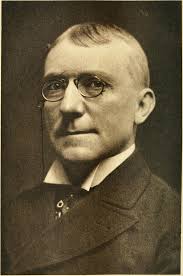Armazindy Page #14
James Whitcomb Riley poems book published in the 1894 book Armazindy and received very negative reviews that referred to poems like "The Little Dog-Woggy" and "Jargon-Jingle" as "drivel" and to Riley as a "worn out genius". Most of his growing number of critics suggested that he ignored the quality of the poems for the sake of making money.
And fraught with sobs—the more profound For that peculiar laughing sound We hear when strong men weep.... I leant With warmest sympathy—I bent To stroke with soothing hand his brow, He murmuring—“’Tis over now!— And shall I tie the silken thread Of my frail romance?” “Yes,” I said.— He faintly smiled; and then, with brow In kneading palm, as one in dread— His tasselled cap pushed from his head;— “‘Her voice’s music,’ I repeat,” He said,—“’twas sweet—O passing sweet!— Though she herself, in uttering Its melody, proved not the thing Of loveliness my dreams made meet For me—there, yearning, at her feet— Prone at her feet—a worshipper,— For lo! she spake a tongue,” moaned he, “Unknown to me;—unknown to me As mine to her—as mine to her.” LEONAINIE Leonainie—Angels named her; And they took the light Of the laughing stars and framed her In a smile of white; And they made her hair of gloomy Midnight, and her eyes of bloomy Moonshine, and they brought her to me In the solemn night.— In a solemn night of summer, When my heart of gloom Blossomed up to greet the comer Like a rose in bloom; All forebodings that distressed me I forgot as Joy caressed me— (Lying Joy! that caught and pressed me In the arms of doom!) Only spake the little lisper In the Angel-tongue; Yet I, listening, heard her whisper,— “Songs are only sung Here below that they may grieve you— Tales but told you to deceive you,— So must Leonainie leave you While her love is young.” Then God smiled and it was morning. Matchless and supreme Heaven’s glory seemed adorning Earth with its esteem: Every heart but mine seemed gifted With the voice of prayer, and lifted Where my Leonainie drifted From me like a dream. TO A JILTED SWAIN Get thee back neglected friends; And repay, as each one lends, Tithes of shallow-sounding glee Or keen-ringing raillery: Get thee from lone vigils; be But in jocund company, Where is laughter and acclaim Boisterous above the name.— Get where sulking husbands sip Ale-house cheer, with pipe at lip; And where Mol the barmaid saith Curst is she that marrieth. THE VOICES Down in the night I hear them: The Voices—unknown—unguessed,— That whisper, and lisp, and murmur, And will not let me rest.— Voices that seem to question, In unknown words, of me, Of fabulous ventures, and hopes and dreams Of this and the World to be. Voices of mirth and music, As in sumptuous homes; and sounds Of mourning, as of gathering friends In country burial-grounds. Cadence of maiden voices— Their lovers’ blent with these; And of little children singing, As under orchard trees. And often, up from the chaos Of my deepest dreams, I hear Sounds of their phantom laughter Filling the atmosphere: They call to me from the darkness; They cry to me from the gloom, Till I start sometimes from my pillow And peer through the haunted room; When the face of the moon at the window Wears a pallor like my own, And seems to be listening with me To the low, mysterious tone,— The low, mysterious clamor Of voices that seem to be Striving in vain to whisper Of secret things to me;— Of a something dread to be warned of; Of a rapture yet withheld; Or hints of the marvellous beauty Of songs unsyllabled. But ever and ever the meaning Falters and fails and dies, And only the silence quavers With the sorrow of my sighs. And I answer:—O Voices, ye may not Make me to understand Till my own voice, mingling with you, Laughs in the Shadow-land. A BAREFOOT BOY A barefoot boy! I mark him at his play— For May is here once more, and so is he,— His dusty trousers, rolled half to the knee, And his bare ankles grimy, too, as they: Cross-hatchings of the nettle, in array Of feverish stripes, hint vividly to me Of woody pathways winding endlessly Along the creek, where even yesterday He plunged his shrinking body—gasped and shook— Yet called the water “warm,” with never lack Of joy. And so, half enviously I look Upon this graceless barefoot and his track,— His toe stubbed—ay, his big toe-nail knocked back Like unto the clasp of an old pocket-book. THE YOUTHFUL PATRIOT O what did the little boy do ’At nobody wanted him to? Didn’t do nothin’ but romp an’ run, An’ whoop an’ holler an’ bang his gun An’ bu’st fire-crackers, an’ ist have fun— An’ ’at’s all the little boy done! PONCHUS PILUT Ponchus Pilut ust to be Ist a Slave, an’ now he’s free. Slaves wuz on’y ist before The War wuz—an’ ain’t no more. He works on our place fer us,— An’ comes here—sometimes he does. He shocks corn an’ shucks it.—An’ He makes hominy “by han’!”— Wunst he bringed us some, one trip, Tied up in a piller-slip: Pa says, when Ma cooked it, “MY! This-here’s gooder’n you buy!” Ponchus pats fer me an’ sings; An’ he says funny things! Ponchus calls a dish a “deesh”— Yes, an’ he calls fishes “feesh”! When Ma want him eat wiv us He says, “’Skuse me—’deed you mus’!— Ponchus know’ good manners, Miss.— He ain’ eat wher’ White-folks is!” ’Lindy takes his dinner out Wher’ he’s workin’—roun’ about.— Wunst he et his dinner spread In our ole wheelborry-bed. Ponchus Pilut says “’at’s not His right name,—an’ done fergot What his sho’-’nuff name is now— An’ don’ matter none nohow!” Yes, an’ Ponchus he’ps Pa, too, When our butcherin’s to do, An’ scalds hogs—an’ says, “Take care ’Bout it, er you’ll set the hair!” Yes, an’ out in our back-yard He he’ps ’Lindy rendur lard; An’, wite in the fire there, he Roast’ a pigtail wunst fer me.— An’ ist nen th’ole tavurn-bell Rung, down-town, an’ he says, “Well!— Hear dat! Lan’ o’ Caanan, Son, Ain’t dat bell say ‘Pigtail done!’ —‘Pigtail done! Go call Son!— Tell dat Chile dat Pigtail done!’” A TWINTORETTE Ho! my little maiden With the glossy tresses, Come thou and dance with me A measure all divine; Let my breast be laden With but thy caresses— Come thou and glancingly Mate thy face with mine. Thou shalt trill a rondel, While my lips are purling Some dainty twitterings Sweeter than the birds’; And, with arms that fondle Each as we go twirling, We will kiss, with titterings, Lisps and loving words. SLUMBER-SONG Sleep, little one! The Twilight folds her gloom Full tenderly about the drowsy Day, And all his tinselled hours of light and bloom Like toys are laid away. Sleep! sleep! The noon-sky’s airy cloud of white
Translation
Translate and read this book in other languages:
Select another language:
- - Select -
- 简体中文 (Chinese - Simplified)
- 繁體中文 (Chinese - Traditional)
- Español (Spanish)
- Esperanto (Esperanto)
- 日本語 (Japanese)
- Português (Portuguese)
- Deutsch (German)
- العربية (Arabic)
- Français (French)
- Русский (Russian)
- ಕನ್ನಡ (Kannada)
- 한국어 (Korean)
- עברית (Hebrew)
- Gaeilge (Irish)
- Українська (Ukrainian)
- اردو (Urdu)
- Magyar (Hungarian)
- मानक हिन्दी (Hindi)
- Indonesia (Indonesian)
- Italiano (Italian)
- தமிழ் (Tamil)
- Türkçe (Turkish)
- తెలుగు (Telugu)
- ภาษาไทย (Thai)
- Tiếng Việt (Vietnamese)
- Čeština (Czech)
- Polski (Polish)
- Bahasa Indonesia (Indonesian)
- Românește (Romanian)
- Nederlands (Dutch)
- Ελληνικά (Greek)
- Latinum (Latin)
- Svenska (Swedish)
- Dansk (Danish)
- Suomi (Finnish)
- فارسی (Persian)
- ייִדיש (Yiddish)
- հայերեն (Armenian)
- Norsk (Norwegian)
- English (English)
Citation
Use the citation below to add this book to your bibliography:
Style:MLAChicagoAPA
"Armazindy Books." Literature.com. STANDS4 LLC, 2025. Web. 11 Jan. 2025. <https://www.literature.com/book/armazindy_946>.




Discuss this Armazindy book with the community:
Report Comment
We're doing our best to make sure our content is useful, accurate and safe.
If by any chance you spot an inappropriate comment while navigating through our website please use this form to let us know, and we'll take care of it shortly.
Attachment
You need to be logged in to favorite.
Log In